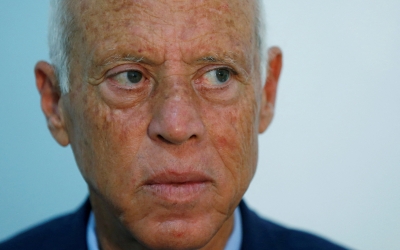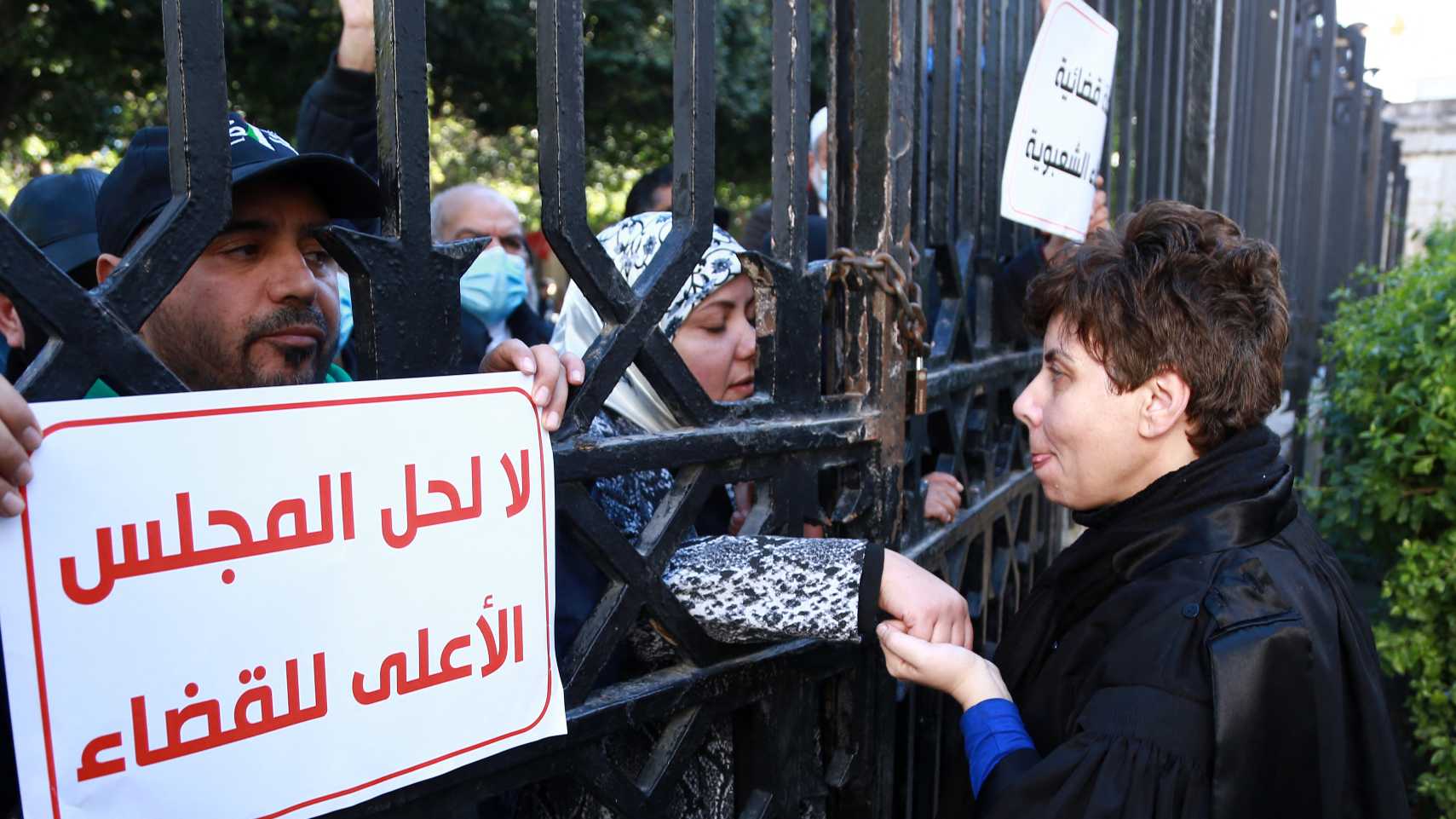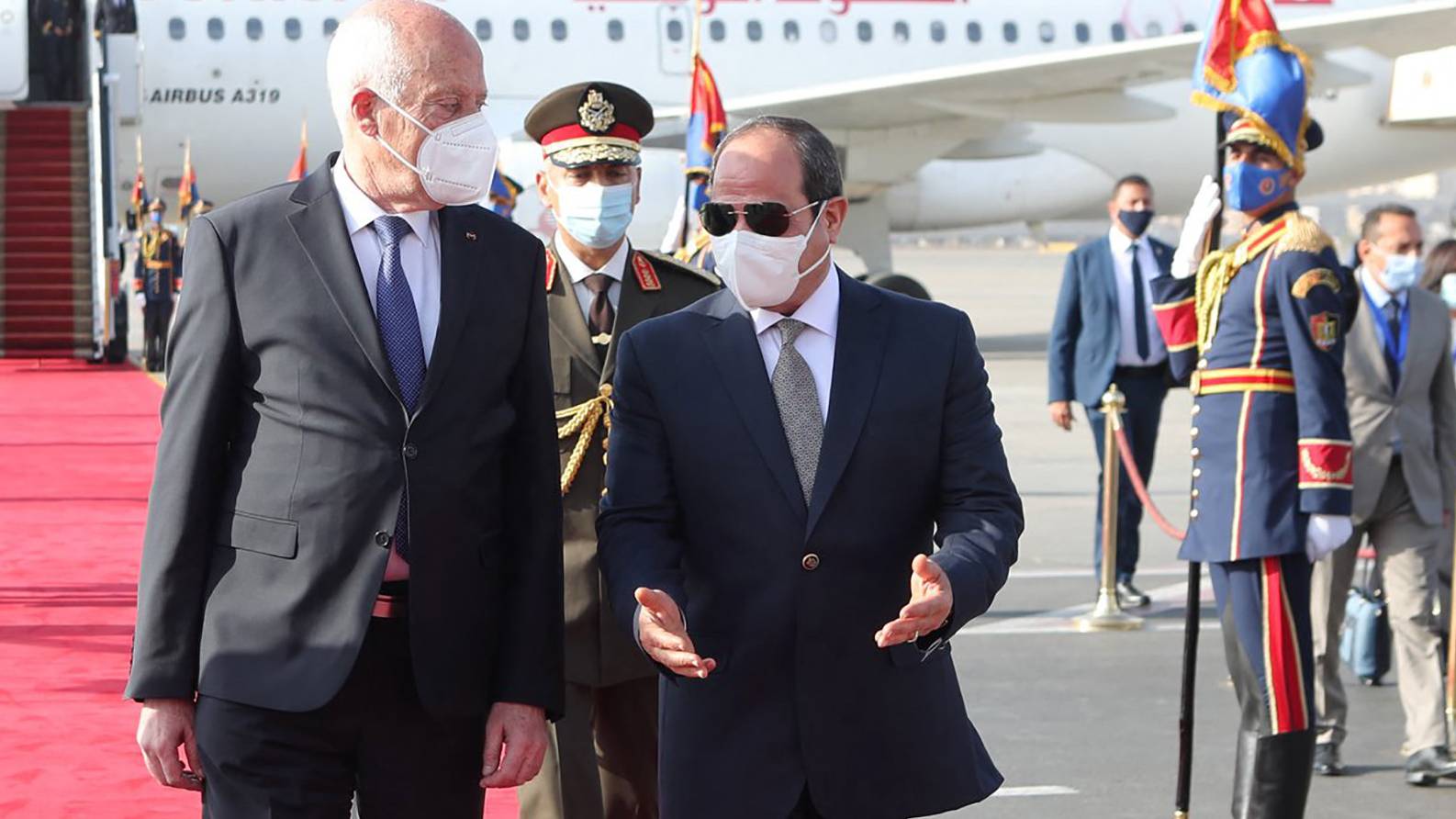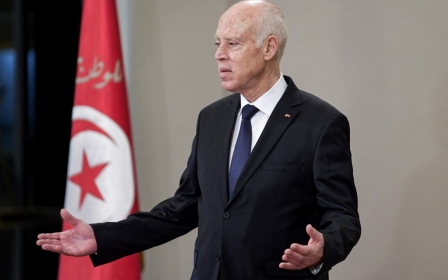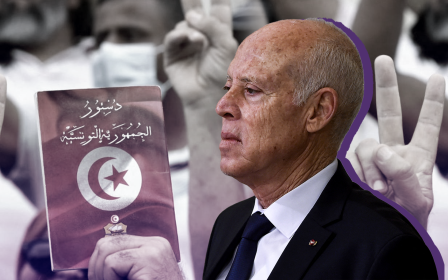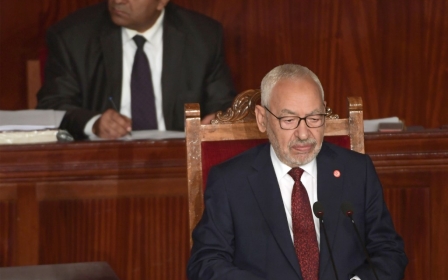Tunisia: Kais Saied's coup does not have a happy ending
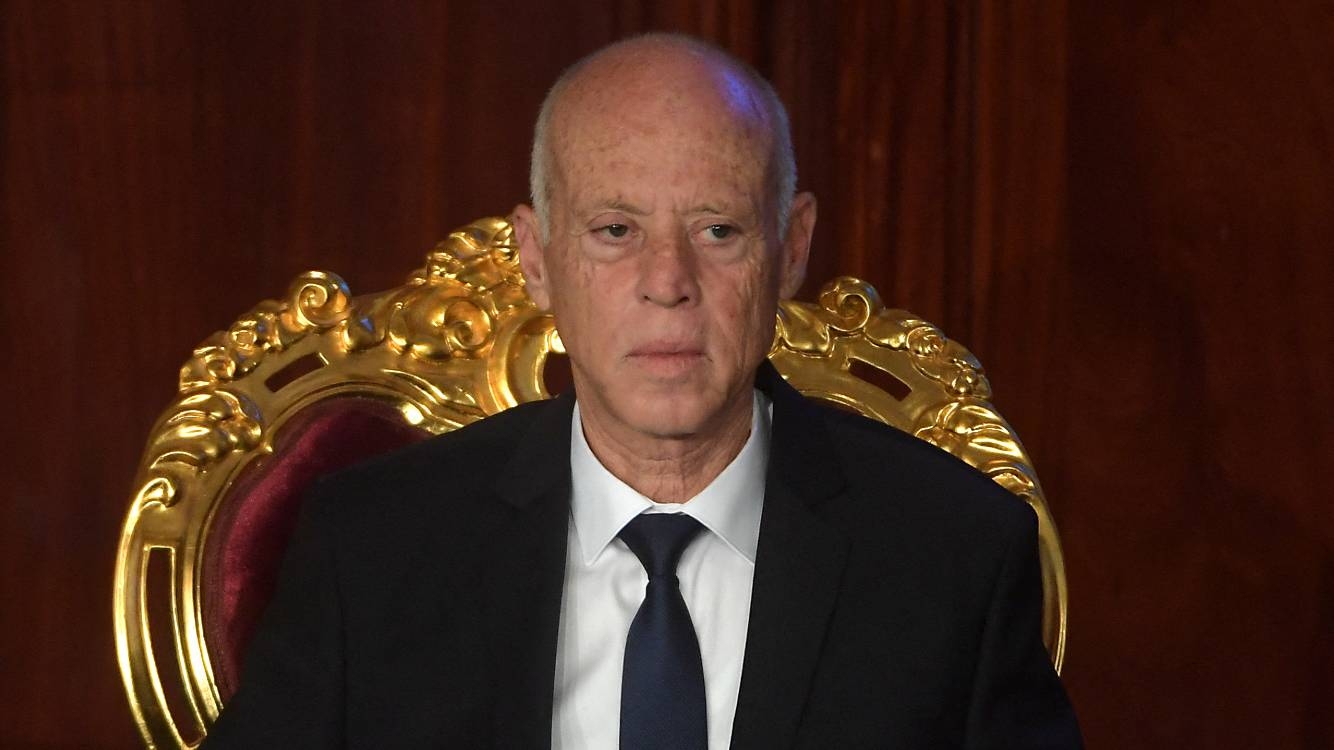
When I broke the story that the Tunisian President Kais Saied's closest advisers were urging him to seize control of Tunisia in a "constitutional coup," the plan we published was dismissed as a fake.
Saeid has made no secret of his intentions. He sees himself as the ultimate expression of the people's will
At the time, panic spread inside the presidential palace, and a hunt began for the leaker of the plan marked "top secret" on every page. It took four days for the president himself to acknowledge the letter was genuine, but claimed it was only one out of hundreds he gets in his daily mailbag.
The publication of the plan delayed the coup, but did not prevent it. Two months later, Saied closed parliament, seized all executive power and attempted to appoint himself attorney general. The then prime minister, Hichem Mechichi, was beaten into resigning, but Saied's principle target, Rached Ghannouchi, the leader of the Ennahda party, slipped the net. He has just been discharged from hospital.
A chorus of support flooded the Tunisian media. Saied's principle cheerleaders were people like the couple who founded and headed the Democratic Current Party, a breakaway faction from the party that backed Moncef Marzouki as president in a power sharing deal with Ennahda.
From 'visionary saviour' to dictator
New MEE newsletter: Jerusalem Dispatch
Sign up to get the latest insights and analysis on Israel-Palestine, alongside Turkey Unpacked and other MEE newsletters
Mohamed Abbou, the founder of Democratic Current, had been the first to suggest that Saied activate an article of the constitution, Article 80, which allowed him to seize power. Abbou talked of him as a visionary saviour.
His wife, Samia Abbou, herself a member of parliament, called Tunisia a fake democracy, ruled by "gangs and thieves". This was on the Sunday night in which the coup took place. Samia trusted Saied when he said the closure of parliament would be temporary, and her plan was to reopen it with the largest party, Ennahda, cleared out.
Within a month, the couple had outlived their usefulness to Saied. When they realised what he was up to, their fury knew no bounds.
Abbou told Jawhara FM radio: "Kais Saied will condemn Tunisia and future generations to live the same system of ruin and corruption for decades... we do not want the state of Qais Saied, but we want the rule of law."
Well, it was a bit late for that.
Mohamed Abbou, himself a lawyer, filed a complaint with the public prosecutor at the Court of First Instance in Tunis demanding Saied's arrest. Abbou claimed in his deposition that Saied had activated Article 80 to achieve a "deep-seated ambition" and that he was acting by "force of arms outside legitimacy". All of which is true. But - again - this realisation comes late in the day.
A similar fate awaited Nadia Akacha, once Tunisia's most powerful woman. There was nowhere Saied would go without her. She was his gatekeeper, the conduit through which all transactions went. Akacha was the person to whom the coup letter was addressed, but in reality she was its mastermind. Last month, she resigned citing "fundamental differences".
It was hinted that she and Saied fell out over a decision to force six senior security officials, including a former intelligence chief, to retire. But just as likely an explanation lay in the jostling for influence by Saied's wife, Ichraf, and his brother Naoufel, who is rapidly becoming an unofficial presidential spokesman.
The Saied dictatorship is becoming a family affair.
The judges' bizarre saga
Last, but by no means least, come the judges. As almost everyone involved in this bizarre saga seems to be legally trained, it should come as no surprise that the next target of Saied’s "jihad" is the judiciary. The top judges are hated by many Tunisians for having done nothing to pursue the people behind the killing of two leftist secular leaders, Chokri Belaid and Mohamed Brahimi.
Belaid's widow has consistently claimed that the Islamist-led government encouraged political violence. The killing of her husband brought thousands of protesters onto the street and was the worst political crisis Ennahda has faced.
Saied is doing to Tunisia what Sisi has done to Egypt. Both used popular disenchantment against Islamist governments to manufacture a coup which would wipe away the liberals who supported their power grab
Even though the political logic of these killings points to forces trying to destabilise the government at Ennahda's expense, and, even though the killings only stopped when Ennahda ceded power, Tunisia's Islamists are still blamed for them.
Using the popular mood as his pretext, Saied announced plans to dissolve the Supreme Judicial Council (CSM), an elected independent body that appoints judges and regulates the judiciary. He accused them of bias, corruption and delaying politically sensitive investigations.
After universal condemnation and the threat of a two-day strike, Saied gave the impression that he was backing down, claiming he would change the law governing the CSM and appoint a temporary body in its place. The CSM has rejected the move and said the temporary council would have no legal standing.
Saeid himself has made no secret of his intentions. He sees himself as the ultimate expression of the people’s will. It follows that all the institutions of state should follow his instructions.
"The judiciary is first a function, and the authority and sovereignty are for the people, and all the rest are functions and not to turn into an authority independent of the state. Decisions are issued in the name of the Tunisian people, and the judiciary is a function and not an independent authority," Saied said angrily.
It is crystal clear what is happening.
Tunisia's Sisi
Saied is doing to Tunisia what Abdel Fattah el-Sisi has done to Egypt. Both used popular disenchantment against governments which Islamists led or participated in to manufacture a coup which would wipe away the liberals who supported their power grab.
The Islamists are not blameless. They sat in parliament for over 10 years fighting political battles while the economy was going to pot. In trying to secure the institutions of democracy, they took their eye off the ball of what was happening to the country.
They said they were not responsible for what the government did. But neither were they in opposition. Neither fully in, nor fully out. Tunisia's Islamists were permanently making political compromises that meant they lost touch with the lives of the very people who came out in their millions to support them.
This opened the door for a populist dictator. Popular discontent with the old parliament is real, but another Gaddafi in North Africa is not the solution. If Saied is turning on the very people he used to lever his way into a position of absolute power, Sisi did the same. He ditched two key generals who helped him seize and secure power - Mahmoud Hegazy, chief of military intelligence, and Sedki Sobhy, his defence minister.
Everyone misjudged Sisi's ruthlessness, including his former boss Sami Anan, an army chief of staff who was about to run against him in the presidential election, and Ahmed Shafiq, the former prime minister. So too is Saied constantly being misjudged.
Saied, however, is steadily losing popularity and the economy is tanking. Partly as a result of Covid-19 pandemic-related restrictions on tourism, national GDP shrank by 9.18 percent in 2020, and the Treasury can barely cover the salaries of Tunisia's enormous public sector. Private debt is "skyrocketing".
The International Crisis Group says in its latest report: "In the short to medium term, Tunisia could be forced either to restructure its public debt – jumping through the hoops of the Paris Club (an informal group of creditor countries that seek to solve indebted countries' repayment problems) to do so – or to declare bankruptcy. In either case, the socio-economic fallout would be painful."
A multi-billion dollar loan from the IMF is stalled. The US State Department and Congress are either holding back funds or threatening to reduce economic assistance.
This is feeding its way back into popular opinion.
What next?
The latest poll finds that 70.6 percent are worried about the future of freedom and democracy versus 29.4 percent who are not, and 67.3 disagree with the president's decisions as opposed to 29.4 percent who do not.
The Gulf countries have shown once again they are more interested in destabilising fragile or potential democracies than they are in state building
In August 2021, 60.8 percent of those surveyed thought what happened was a "correction of the revolution" while only 39.2 percent said it was a coup. However, by January 2022, those positions had reversed. Now 64.8 percent believe it was a coup and only 35.2 percent still say it was a correction. The mood has changed from the near euphoria that greeted Saied's arrival.
What will Saied do next after he has crushed an independent judiciary?
My guess is that he will ban all political parties. He may start with Ennahda, but be sure within a short time he will move against all parties. This - again - should come as no surprise, as he said the era of parties was finished, well before he was elected president.
He has been buttressed by three factors.
The virus of counter-revolution circulating freely around Tunisia has infected the country's once neutral army and security apparatus. And it is only their acquiescence that allowed Saied to take the steps he has done. But Saied has also been helped by continuing divisions within the political opposition and a trade union movement which equivocates. One minute it condemns, the next it vows it can never support a return of the political system as it was before the coup.
Everyone from secular to Islamist now realises that Saied represents a real and potent danger. But they are still a long way from supporting each other, as they did against former dictator Zine El Abidine Ben Ali. And the third factor is the reluctance of the international community, from the US to Europe, to get involved. Yes, they come out with the right statements.
No happy ending
Chris Murphy, the only US senator to have met Saied, said: "It's becoming impossible to believe President Saied's claims that he is committed to transitioning his country back to democracy. ... President Saied has pledged to turn around his country's economy and root out corruption - admirable goals that the Tunisian people have long demanded. But he cannot successfully do that without the international community's financial support, and we need to make clear that support is linked to a democratic course correction."
Everyone from secular to Islamist now realises that Saied represents a real and potent danger. But they are still a long way from supporting each other
However, they are reluctant to match these words with action. No one in Washington is using the "c" word and possibly private assurances are still given to Saied. This is the height of folly. France in particular could make a real difference as to whether Saied stays or goes.
And yet Tunisia's complete economic collapse would send hundreds of thousands of migrants over the Mediterranean again.
Saied's problems are mounting. No Arab country has come to his aid with the sort of the money he really needs. The Gulf countries have shown once again they are more interested in destabilising fragile or potential democracies than they are in state building. In this respect, Tunisia is simply the latest example of a trend repeated in Yemen, Sudan, Egypt and Syria.
As Saied's problems mount, so too will his desperation. This will not have a happy ending.
The views expressed in this article belong to the author and do not necessarily reflect the editorial policy of Middle East Eye.
This article is available in French on Middle East Eye French edition.
Middle East Eye delivers independent and unrivalled coverage and analysis of the Middle East, North Africa and beyond. To learn more about republishing this content and the associated fees, please fill out this form. More about MEE can be found here.



